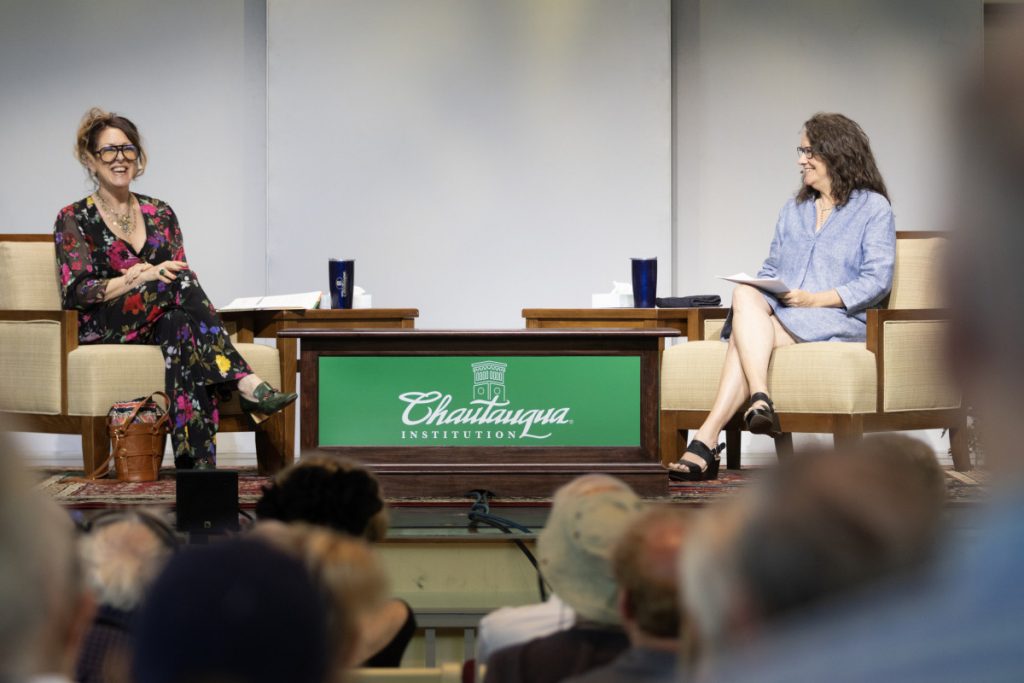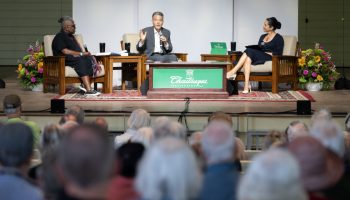
SAG-AFTRA Secretary-Treasurer Joely Fisher, left, and Kelly Carlin discuss the profound ramifications AI has had in their creative professions and personal lives during their conversation as part of the Chautauqua Lecture Series Wednesday morning in the Amphitheater.
Joely Fisher began her and Kelly Carlin’s Wednesday morning conversation with a simple declaration: “We are nepo babies!”
Fisher, whose late half-sister Carrie is known around the world for her role in “Star Wars,” and Carlin, whose father George is considered amongst the most important comedians of the 20th century, are no strangers to the world of entertainment, having spent their entire lives in and out of the spotlight.
Because of that close proximity, they have seen first-hand the ways that new developments in artificial intelligence have encroached upon the entertainment industry, creating what the pair considers to be an “existential moment” for both their industry and the world.
In 2021, Fisher was elected secretary-treasurer of SAG-AFTRA, the trade union that represents over 150,000 media professionals worldwide, including nearly every actor in every Hollywood film. In 2023, she helped organize the SAG-AFTRA strike that shut down Hollywood for nearly four months.
AI was at the center of the strike.
“A critical piece of our contract negotiations was this existential moment of AI,” Fisher said. “When I walked into the negotiations on day one, I heard an executive … (say), ‘We are here to make a deal, but this is not going to be in it.’”
The “this” that executive was referring to was a push from SAG-AFTRA to eradicate the use of “synthetic performers,” or digital replicas of actual actors. During the COVID-19 pandemic, many production companies started gathering full-body scans of actors in films and TV shows. With those scans, they would be able to make movies featuring those actors — whether or not the actors agreed to it, or even knew about it.
Fisher described AI in film and television as one of the industry’s most pressing issues; actors and other media professionals are losing the rights to their own likenesses, and production companies have almost no reason not to engage in the practice.
“Why would we negotiate a technology that we fully intend to use?” Fisher recalled a production company executive asking.
The executive’s rhetorical question is what ultimately pushed SAG-AFTRA to strike; at the same time, the Writers Guild of America was also on strike — AI was a key issue there as well. The key argument from both striking unions was that creatives deserved to maintain control over not only their likenesses, but also their acts of creation in and of themselves.
Ultimately, both unions voted to end their strikes, ratifying new contracts that added some protections against AI. But Fisher was clear that a contract agreement alone would not be enough to protect the entertainment industry from the malicious use of AI.
“Here is what we need,” she said. “We need federal legislation to enforce all of those things.”
On the morning of Jan. 10, 2024, Carlin woke up to a storm of texts from friends and family, all asking her the same thing: had she seen the new George Carlin special?
A pair of comedians on a podcast called “Dudesy” had fed an AI model all of her father’s material, and the AI model used it to generate a new comedy special featuring George Carlin, who died in 2008. The generated special was called “I Am Glad I Am Dead.”
“My reaction was rage because — well, for a lot of reasons,” Carlin said to a stunned, silent Amp. “I am an only child, I am the one taking care of my dad’s legacy. … I have been doing that since the day he died.”
She described the disgust she felt after discovering the podcast episode — and the AI-generated comedy special that came with it. The special was actually just a still image of the back of the late Carlin’s head, looking out toward a static audience, complete with canned laughter for each joke.
“The first … emotional experience of it was feeling violated, like a sense of corporeal violation — a soul violation,” she said. “It is not me — they are not imitating me, but it is my father.”
Carlin said her father was incredibly protective of his creative output, things like his words, his comedy, and his media presence, and that he would never approve of his likeness being co-opted the way it was by the podcast. So she released a statement on Twitter, lambasting the podcasters — and anyone who used AI to steal the work and likeness of other people without their consent — and imploring viewers to “let the artist’s work speak for itself.”
The post was viewed by over 6 million people, many of them lawyers who reached out about filing a lawsuit that, in their eyes, had the potential to drastically alter the AI landscape in the United States. Carlin partnered with one, and they sued “Dudesy” 10 days later.
But the case didn’t yield the result they were expecting. Instead, one of the podcasters revealed that he was the one who wrote the comedy special, and AI was only used to create the audio and video of the special.
“It was a huge relief that AI is not that intelligent yet,” Carlin said. “In some ways I am really glad I was abducted into this issue, because I think I would have really ignored it otherwise, and just let it be a thing that is happening. … But, so much of this issue is not just on creativity and art, but like I said, on being a human.”
The legal battle Carlin embarked on is what ultimately introduced her to Fisher. Fisher said that their meeting was the result of “divine intervention,” quipping that “both of (their) fathers up there — or down there,” had brought them together.
It’s worth noting that Fisher also had a family member brought back to the screen by AI; her half-sister Carrie Fisher made a posthumous appearance as General Leia Organa in 2019’s “Star Wars: The Rise of Skywalker,” released three years after her death. In this case, however, Fisher’s family was asked for their approval before her likeness was used in the film — starkly different from the AI-generated Carlin special.
Carlin and Fisher were clear, though, that AI threatens more than just actors and other onscreen personalities in the entertainment industry. Carlin, whose husband is a director of photography and camera operator, noted a recent advertisement for Toys ‘R’ Us that was created entirely by AI; there were no actors, no camera operators, no makeup artists.
“Our industry is built on community,” Carlin said. “Humans get together to make these things.”
Carlin placed extra emphasis on “humans,” arguing that AI would never be able to recreate the humanity that is at the core of all art. She said that AI did not actually learn from experience or understand the human condition, asserting instead that “they are just inhaling what they know and spitting it out.”
Entertainment artists and executives, however, disagree over how important the human touch really is. Fisher said that the focus of many executives shifted from creativity to cost-efficiency, prioritizing “profit over product.” So, in the eyes of many studio executives, there is no reason for them to continue paying actors, writers, camera operators, or any other media professionals if AI can create content that is more likely to turn a profit.
But Carlin and Fisher don’t think hope needs to be completely lost.
State legislatures in California and Tennessee are working to pass legislation that will protect the public from their likenesses being used by AI to generate content. At the federal level, there is bipartisan support for laws banning “artificial replica(s) without authorized use,” gaining traction in Congress.
They implored Chautauquans to keep up the pressure, to reach out to their representatives or their senators to push for a law that would offer more protection against unethical uses of AI — for both the entertainment industry and the general public.
“This is not just about artists and musicians,” Carlin said. “This will protect citizens — everybody will have some sort of legal pushback against (AI).”
Whether or not studio executives agree, the pair was clear that the connection that is often only found through movies, music, literature, and all other forms of art was central to the human experience, and could never be fully replaced by AI. They said that since the beginning of humanity, art has always been the tool humans use to “share our humanity with one another.”
That was the message that carried all the way through Carlin and Fisher’s conversation: No matter how hard anyone tried, AI would never be able to replace the ability of humans to connect with one another. Carlin concluded the conversation, the third installment in this week’s Chautauqua Lecture Series theme, “The AI Revolution,” by reading an excerpt from Mary Oliver’s “The Summer Day.”
“Doesn’t everything die at last, and too soon?” she read. “Tell me, what is it you plan to do with your one wild and precious life?”




